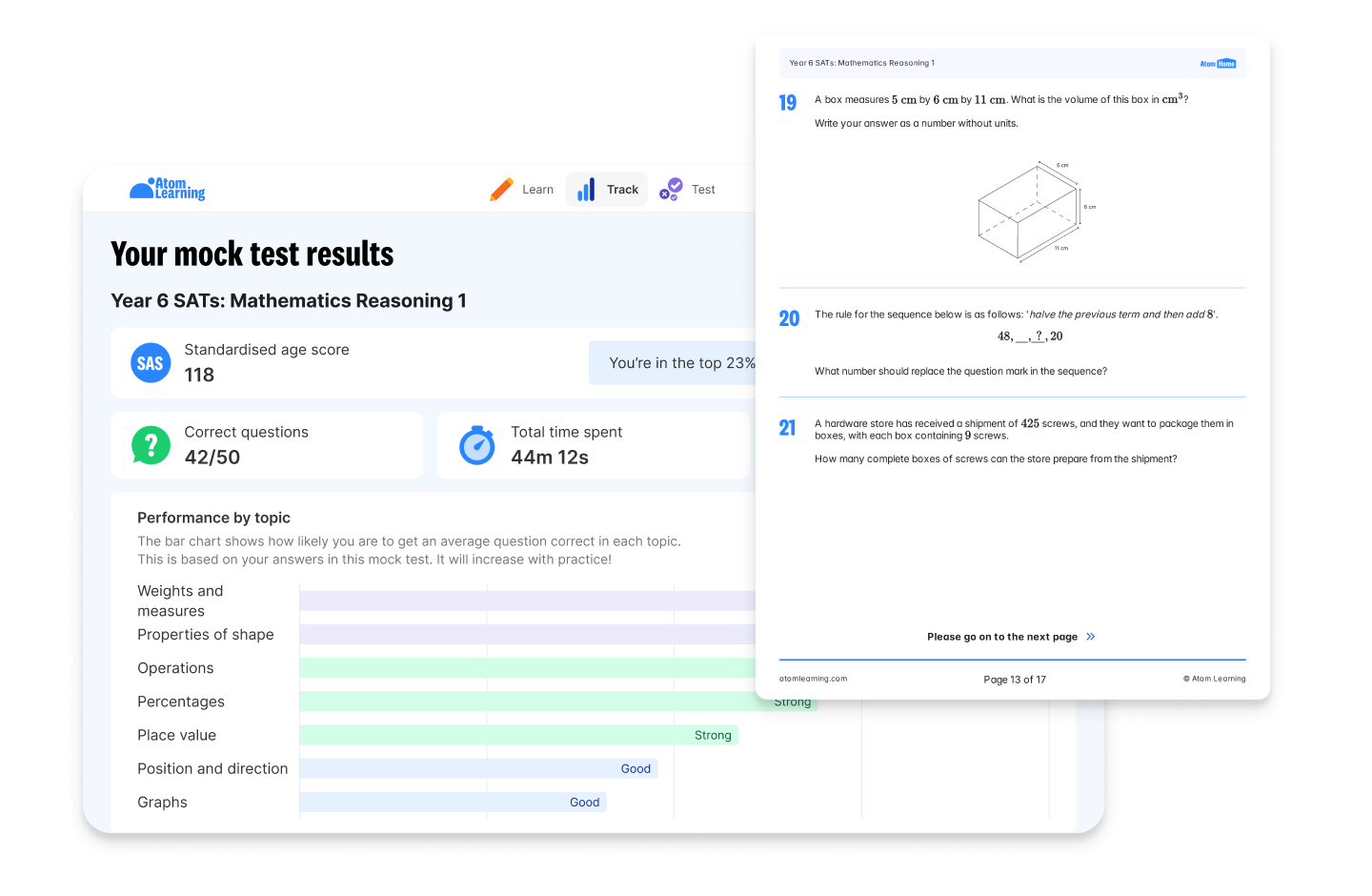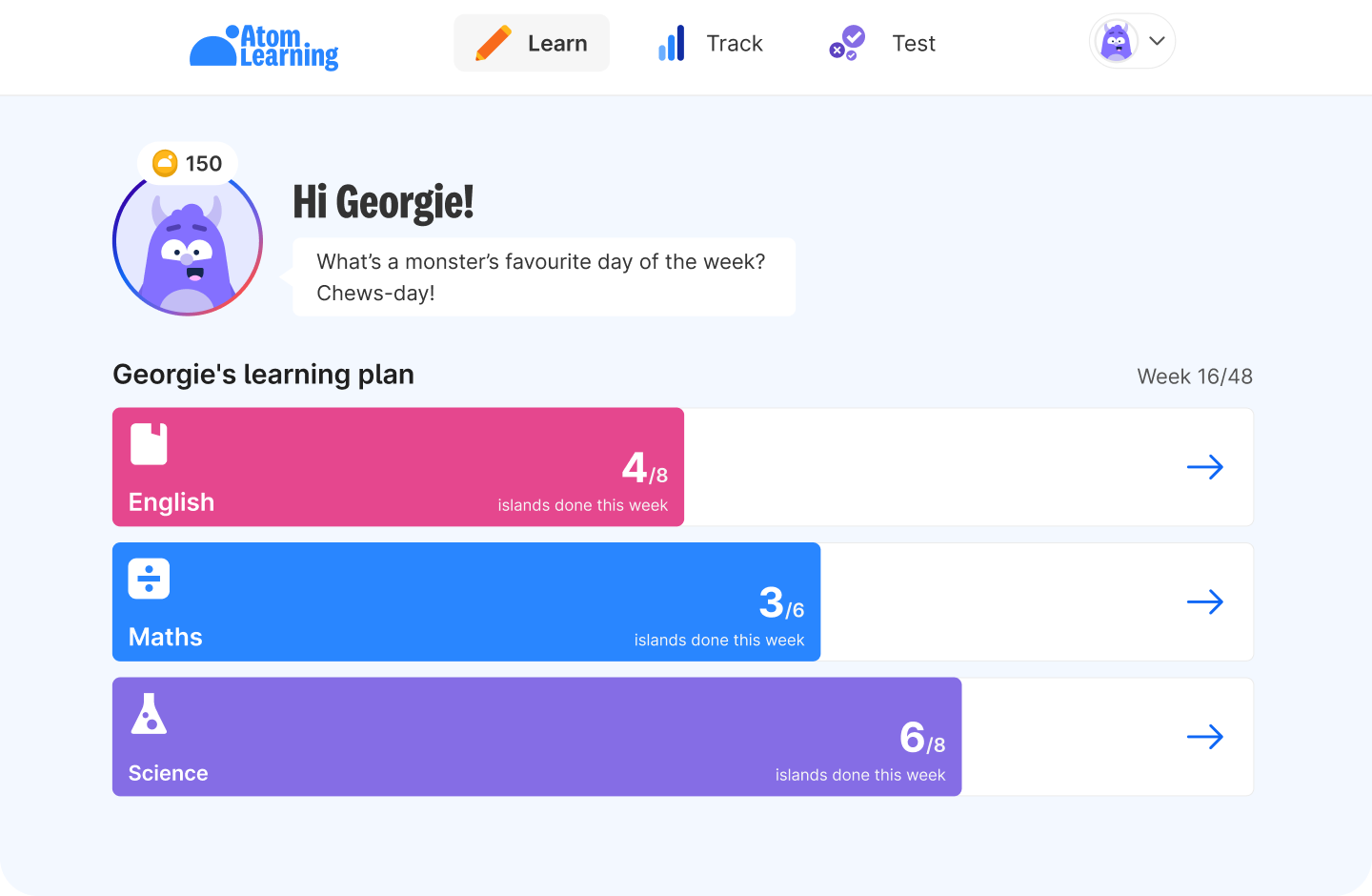Key Stage 3 explained

If your child is transitioning from primary school to secondary school this autumn, you might be wondering what new subjects they'll be studying.
From Year 7 to Year 9 (the first three years of secondary education), your child will progress through Key Stage 3. Keep reading for a breakdown of the UK national curriculum and download free resources to help your child with their summer preparation.
Key Stage 3 explained: the national curriculum
State-funded schools are obliged to follow the national curriculum, while independent schools have more freedom over the subjects they teach. However, most schools closely adhere to the national curriculum and you can expect that the bulk of the subjects will remain the same.
- English
- Maths
- Science (including biology, chemistry and physics, which might be taught as separate timetabled subjects)
- History
- Geography
- Modern foreign languages (normally one or more of French, Spanish, German and Italian)
- Design and technology (normally a combination of woodwork, graphic design, and cooking and nutrition)
- Art and design
- Music
- Physical education (PE)
- Computing
- PSHE (personal, social, health and economic education, which includes topics on citizenship, relationships and sex education)
- Religious education (RE)
- Welsh (Welsh schools only)
What are the core subjects in secondary education?
English, maths and science are often referred to as core subjects. This is because they are compulsory subjects which your child must take when they progress to Key Stage 4 and take their GCSE exams.
Secondary schools often 'set' students in these subjects. Setting (sometimes known as streaming) is a process where children are placed into different classes for the same subject, depending on their ability. Children who can successfully work at a faster pace will be placed into a higher set, whereas children who need more teacher support and time to understand concepts are placed in a lower set.
To decide sets, schools look at:
- KS2 SATs results and transition information from primary school
- Baseline assessments at the start of Year 7
- Cognitive ability tests (like CAT4 in some schools)
- How children perform in class and respond to feedback
Sets aren’t permanent. They’re reviewed regularly to make sure each child is being appropriately challenged and supported.
What will my child learn in English in Key Stage 3?
English is a combination of English Language and English Literature.
English Language assesses students' reading, writing, speaking and listening skills while English Literature is the study of different genres of text (such as prose, poetry and drama), with an emphasis on critical analysis. The assessment framework covers four main areas:
Reading
Students are taught to develop an appreciation for reading, to understand increasingly challenging texts and to read critically. The texts studied include a wide range of fiction and non-fiction, including works from pre-1914 literature, contemporary literature, seminal world literature and two Shakespeare plays.
Writing
Your child will be taught to write accurately, fluently and efficiently and plan, draft, edit and proofread their work. Students learn how to write for a wide range of purposes and audiences, consider how their writing reflects these audiences and purposes, and improve their vocabulary, grammar, spelling, punctuation and structure.
Grammar and vocabulary
Children are taught how to consolidate and build on their knowledge of grammar and vocabulary, including understanding the differences between spoken and written language and being able to confidently use linguistic and literary terminology.
Spoken English
Students learn how to give short speeches and presentations, participate in formal debates and how to improvise, rehearse and perform play scripts and poetry.
What will my child learn in maths in Key Stage 3?
The aim of maths at Key Stage 3 is to help students become fluent in the fundamentals of maths, reason mathematically and solve problems both with and without a calculator.
There are six main areas covered in maths at Key Stage 3:
Number
Your child will learn how to efficiently and successfully use decimals, positive and negative integers, fractions, prime numbers, factors, percentages and units of mass, length, time and money.
Algebra
Pupils are introduced to algebra in Key Stage 3. This includes using and interpreting algebraic notation, simplifying and manipulating algebraic expressions, using linear and quadratic graphs and recognising arithmetic sequences.
Ratio, proportion and rates of change
Your child will be taught how to change freely between related standard units, use scale factors, diagrams and maps, express quantities as fractions, use ratios, solve problems involving percentage change and direct or inverse proportion, and use compound units (e.g. speed, pricing and density) to solve problems.
Geometry and measures
Pupils are taught how to apply formulae to calculate and solve problems, draw and measure line segments and angles, understand the properties of triangles, use Pythagoras' Theorem, and solve 3D problems.
Probability
Pupils are taught how to record, describe and analyse using probability experiments, use tables, grids and Venn diagrams, and understand single and combined events (such as equally likely and mutually exclusive outcomes).
Statistics
Your child will be taught the averages (mean, mode, median and range), how to construct and interpret tables, interpret charts and diagrams and describe simple mathematical relationships between two variables.
What will my child learn in science in Key Stage 3?
The national curriculum for science covers the three key sciences of biology, chemistry and physics. Your child may see these as separate subjects on their timetable.
Biology
From Years 7 to 9, your child will learn about:
- The body, including cells and organisation, skeletal and muscular systems, gas exchange, cellular respiration and inheritance (chromosomes, DNA and genes)
- Human reproduction, including male and female reproductive systems, the menstrual cycle and the process of fertilisation to birth
- Plants, including flower structure, pollination, fertilisation and photosynthesis
- Relationships in an ecosystem, including food webs and how organisms affect and are affected by their environment
Chemistry
Chemistry at Key Stage 3 includes the study of:
- Matter, including the different states, atoms, elements and compounds
- Pure and impure substances, including techniques for separating mixtures
- Chemical reactions and energetics
- The Periodic Table, including patterns and properties
- Materials, including metals and carbon
- Earth and the atmosphere, including the composition and structure of the Earth, the rock and carbon cycles and the composition of the atmosphere
Physics
In Key Stage 3 Physics, children will study:
- Fuels, including calculating fuel uses and costs in a domestic context
- Energy changes and transfers, including changes in systems and energy in matter
- Motion and forces
- Pressure in fluids
- Observed waves, including sound waves, energy and light waves
- Electricity, including current and static electricity
- Magnetism
- Physical changes in matter
- Particle model
- Space physics
How Atom can help
We know that leaving primary school can be daunting for both children and their parents. It’s a shift in your child's expectations, independence, and workload. Atom Home is here to help your child feel confident and ready for the challenge.
Atom’s Year 6 Curriculum Tests are the first step in that support. These adaptive tests identify how well your child has mastered Key Stage 2, and what to focus on as they move into Key Stage 3.

Pictured: The list of Atom Home's progress tests, showcasing the Year 6 Curriculum Tests available for each subject.
What you’ll get from Atom Home:
- Clear insight into your child’s learning: Identify any gaps in English, Maths and Science so you can target support before secondary school starts.
- Adaptive learning that grows with them: Atom personalises learning in real-time. As your child improves, so do the challenges, keeping them engaged and progressing at the right pace.
- Expert explanations and video lessons: Every question has detailed, teacher-written help. Your child can build confidence independently, without waiting for the next lesson in school.
- Smart progress tracking for parents: You’ll clearly see where your child is performing well and where they might need a little extra help – no guesswork.
- A smoother transition to KS3: With learning mapped to the national curriculum for Years 6 and 7, Atom bridges the gap between key stages. It’s learning that builds momentum, not stress.
Make SATs preparation clear and manageable.

Worried about how ready your child is for Year 6 SATs? With so much content covered across Key Stage 2, it can be difficult to know where they’re secure and where they need to improve. Atom breaks preparation into simple, weekly steps, so they build confidence in every subject without feeling overwhelmed.
- Follow personalised weekly exam plans that focus on the exact skills assessed in English and maths SATs.
- Build exam technique with SATs practice papers that mirror real question formats and timing.
- Track progress with clear topic-level insights, so you can spot gaps early and support improvement long before assessment week.
Start your free trial and help your child feel ready, confident and prepared for SATs.



